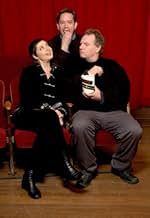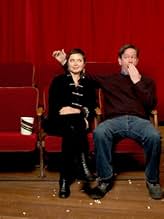The Saddest Music in the World
- 2003
- Tous publics
- 1h 40min
Une sorte de comédie musicale à Winnipeg, lors de la Grande Dépression, où une baronne de l'industrie de la bière organise un concours afin de trouver la musique la plus triste au monde. Des... Tout lireUne sorte de comédie musicale à Winnipeg, lors de la Grande Dépression, où une baronne de l'industrie de la bière organise un concours afin de trouver la musique la plus triste au monde. Des musiciens des quatre coins du monde arrivent en ville pour tenter de remporter le prix de... Tout lireUne sorte de comédie musicale à Winnipeg, lors de la Grande Dépression, où une baronne de l'industrie de la bière organise un concours afin de trouver la musique la plus triste au monde. Des musiciens des quatre coins du monde arrivent en ville pour tenter de remporter le prix de 25 000 dollars.
- Réalisation
- Scénario
- Casting principal
- Récompenses
- 6 victoires et 7 nominations au total
- American Mother
- (as Nancy Drake)
Avis à la une
Maddin manages to balance the grotesque comic caricature of Mark McKinney as the shady mustached businessman who tries to win the competition, and Maria de Medeiros, who gets life advice from her tapeworm, with the pathetic goth character that's McKinney's brother, who's had to deal with the loss of a son, and the glamorous Isabella Rossellini, who's had to deal with the loss of her legs. (I wonder if the fact that Rossellini lost her legs in a car accident caused by her performing fellatio is a nod to the Myth of Murnau.) There's almost a subliminal melodrama taking place with the theme of loss and hilarious depression (during The Depression). It's an exciting movie visually, but unlike the best of the silents that Maddin loves, it's not poetic in that slow, beautiful way -- it's too fast-paced, kinetic, and rough to achieve any sort of traditional beauty -- but it is a feast. The few scenes of gaudy color -- reds, blues, and odd flesh tones -- are as grainy as the black and white. Maddin is truly one of the most imaginative of directors and he has a firm grasp of the medium. In fact, there is at least one scene of slow, beautiful poetry -- a purely silent moment, near the end, that comes alongside the bloody murder of Rossellini's screams. 10/10
Outside the theatre, I glanced up at the box office board: There was another viewing at 11:55 p.m. I impulsively bought another ticket and saw it again.
This is one of the funniest, most original and absurd movies I have ever seen. I feel like I can't believe I've actually seen it -- waking up dizzy at 2 PM today on a Saturday and pondering this movie.
All I remember is the wonderful music, the great one-liners, and those fanciful legs. Oh, for legs such as those!
Everyone must be forced to sit through this film as punishment for watching any television, ever.
Isabella Rossilini should be so proud of forging through the offers of banal roles and accepting roles such as this. It is not a surprise that the same actresss who allowed David Lynch to strip and bruise her in Blue Velvet would embrace such a role as Port-Huntley. If you're sad, and like beer, she's your woman!
The audience last night was howling with laughter and delight at the absurd and brilliant lines in this movie. There was so much to like about this spectacular musical.
But most of all, there were those intoxicating legs.
The film might have been a collaboration between David Lynch, Orson Welles, Eisenstein, and the Brothers Quay - each of them disagreeing what the film should be about. It was worth trying. I quickly got used to the extremely smudgy effect - as if the lens had been smothered in vaseline - and I appreciated Isabella Rosselini (looking and sounding like her mother) and the big-eyed Maria de Madeiros.
The backdrop was a music contest between international contestants to find the world's saddest music. The face-off heats was pure Python but it was all kept strangely distant. There were several problems: the emotional drama between the father and the two sons was dreary, as such issues always are. Secondly, it wasn't funny, and that was because it was all art and no emotional intelligence. Thirdly, it said nothing. It was full of ideas, but they were all microscopic, worked out at scene level - or even frame level. The whole thing put together didn't add up to anything. In the end, the images were everything, and that is always going to be disappointing.
First off, Guy Maddin's films are an acquired taste. Second, it helps to be a film fan and to have a knowledge and love of early cinema to truly appreciate them. Third, you must be willing to give yourself over totally to his particular vision. Don't even try to fight it. Do all this and get ready to enjoy.
"The Saddest Music in the World " is a wonderful amalgam of comedy, drama,
tragedy and farce. It's got a cast of characters that are familiar and yet strange at the same time. Just when you think it's heading in one direction, it yanks you in another. It has an internal logic just like a dream.
The photography, art direction and sound design add to the uniqueness of the
experience. The film feels like an artifact, a lost film that was hidden away by a studio in the '30s because it was too wild and broke too many rules. In fact, it's film-making that defies the system.
The DVD contains a making of featurette that is enjoyable to watch. There are also 3 short films. Only Maddin could make a film with the title "Sissy Boy Slap Party" and make it funny.
Please take a chance and rent/buy this film. It's not the typical Hollywood
product (although it mines Hollywood's past) and for that we should be glad.
I also have to recommend another film by Guy Maddin- "Dracula: Pages from a
Virgin's Diary", a silent film ballet. I got it sight unseen and love it. The director's commentary was worth the price alone.
I'm a Guy Maddin fan. I have developed an addiction for his work. Thank God!
Set in 1933, "the depths of the Great Depression", the location is Winnipeg, Canada, home of Lady Port-Huntly (Isabella Rosselini), the astoundingly wealthy beer baroness of Canada, who decides to hold a contest to select the saddest music in the world--for business reasons, of course. Among the entrants are her former lover, Chester Kent (Mark McKinney), his current lover Narcissa (Maria de Medeiros), Chester's estranged brother Roderick (Ross McMillan)--separated from Narcissa, and the men's father, Duncan (Claude Dorge). Duncan represents Canada; Chester, America; and Roderick, Serbia (of all places).
The prize is $25,000, a fortune in those days, so naturally there are entrants from all over the world--among which are Mexico, Siam, and Africa. The music is inspired, but eventually converges on the lilting popular American tune The Song is You, for which there are diverse renditions in the course of the film. The show-stopper is the version by Chester near the end, a big band production that fuses influences, in typical American fashion, from all over the world.
Familial tensions converge with unrequited love, and with the most peculiar prostheses anyone has ever seen--either in real life or on film. Lady Port-Huntly is a double amputee, and he whose reckless mistake resulted in her unfortunate current condition fashions for her a pair of legs that must be seen to be believed.
The entire film is shot using a blue-haze filter, with a faux stereopticon effect that narrows the viewing screen to that resembling what one would see from the early days of film, and with the faintest, subtlest and tiniest of lags in action-speech synchronization that makes this uncannily resonate as a work fusing a 30s setting, a pre-20s style, and a contemporary sensibility that knows how to combine these elements in the first place. This is a truly brilliant--I would even call it genius--approach to filmmaking that noone else in the known world even remotely approaches. Maddin is one of the contemporary masters of cinema and this is the proof.
As soon as this is available on DVD, I will buy it immediately. I suggest you do the same.
Le saviez-vous
- AnecdotesSome actors are given an "additional camera" credit, as they shot footage on handheld Super8 cameras.
- Citations
Lady Port-Huntley: If you are sad and like beer, I'm your lady.
- Bandes originalesThe Song is You
Music by Jerome Kern
Lyrics by Oscar Hammerstein II
Used by permission of Universal - Polygram International Publishing, Inc.
Meilleurs choix
- How long is The Saddest Music in the World?Alimenté par Alexa
Détails
- Date de sortie
- Pays d’origine
- Langues
- Aussi connu sous le nom de
- La canción más triste del mundo
- Lieux de tournage
- Sociétés de production
- Voir plus de crédits d'entreprise sur IMDbPro
Box-office
- Budget
- 3 500 000 $CA (estimé)
- Montant brut aux États-Unis et au Canada
- 699 225 $US
- Week-end de sortie aux États-Unis et au Canada
- 37 743 $US
- 2 mai 2004
- Montant brut mondial
- 854 994 $US
- Durée1 heure 40 minutes
- Couleur
- Mixage
- Rapport de forme
- 1.85 : 1
































